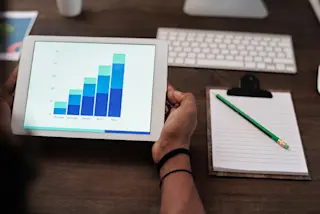Embracing Change: AI's Role in the Post-Cookie Era
Measuring effectiveness of digital campaigns has always been challenging. With the decline of third-party cookies, it’s about to get even harder. This transition affects the process of cultivating audiences for media buying, targeting, and personalizing the buyer communication journey. So what can the advertising sector do?

Artificial Intelligence (AI) doesn't just offer an alternative to traditional measurement strategies; it revolutionizes how we assess the impact of our media investments by offering advanced insights into the buyer’s journey. We can now access a level of visibility and precision that felt daunting with the demise of third-party cookies. Businesses can gain a deeper understanding of customer behaviors and preferences, perform better attribution, and extract rich audience insights to make better decisions and maximize marketing impact.
The advertising industry has been confronted with a massive shift. With the impending deprecation of third-party cookies, brands and marketers should have braced themselves for impact. Yet, according to a report jointly published by Plus Company and Statista, 75% of companies have not taken actionable steps to prepare for this "Cookiegeddon."
Why are so many companies in the media space hesitant to embrace change, especially when inaction could significantly impact their businesses?
Indecision is a Decision: The Consequences of Cookie Deprecation on Digital Marketing
For many, the hesitation comes from a lack of understanding of the implications to their business, as well as lack of clear alternatives.
The impact of cookie deprecation is directly proportional to the role that digital marketing plays in business’ media plans.
Let's consider an example where a user, Alice, is planning to buy a new pair of running shoes. Over the course of a week, Alice:
Sees an ad for running shoes on a sports blog (Impression 1).
Later, clicks on a related ad on a social media platform (Click 1).
The next day, reads a review about running shoes on a different website and clicks on an ad there (Click 2).
Finally, after seeing a remarketing ad on a news site, clicks on the ad and makes a purchase (Conversion).
In this scenario, third-party cookies track Alice's journey across these different sites, allowing the attribution model to credit each touchpoint (impressions and clicks) that contributed to her decision to purchase. This helps marketers understand which channels and ads are most effective, informing future ad spend and strategy.
After Cookie Deprecation
With third-party cookies gone, the string of interactions before that final click become obscured. Losing tracking capabilities can lead to diminished conversion rates, resulting in less effective campaigns, a higher cost of acquisition, and a skewing of the ROI of ad spends.
The First-Party Data Mirage
Seventy-five percent of businesses are pivoting towards investing in first-party data. Yet, this strategy can be problematic because of the high costs of maintaining sophisticated tech stacks and the issues of data accessibility and asymmetry favoring large media platforms like Meta. Even more concerning, some are contemplating a return to Media Mix Modeling (MMM)—the same method they previously discarded for lacking actionable insights—because it doesn't depend on cookies.
Despite the focus on first-party data by leading industry bodies, unrecognized alternatives exist. This is a great opportunity for innovators—technologists and CMOs alike—to steer the industry in new directions with the help of Artificial Intelligence.
AI: Pioneering the Path Forward
AI isn't new in measurement – many social media and programmatic advertising platforms have been integrating select AI features for some time. But now there's a shift towards using AI to enhance decision-making, not just in speed but in providing a holistic view.
63% of CMOs will turn to AI for consumer insights in a post-cookie world and it's no wonder: AI has the power to transform measurement.
CMOs are optimistic about AI's potential to transform measurement. Indeed, 63% are planning to use AI to gain insights into consumer behavior in a cookieless world and it's no wonder: 73% percent concur that real-time data processing and interpretation by AI aids in agile and informed decision-making. The potential for AI to predict the effectiveness of creative content, optimize ad spend across channels for maximum ROI, and anticipate marketing risks by modeling potential outcomes is widely acknowledged.

CMOs agree that AI can enhance marketing performance by informing decision-making, predicting the effectiveness of creative content, optimizing ad spend for maximum ROI, and anticipating marketing risks by modeling potential outcomes.
The AI-centric solution fundamentally re-imagines what we measure and how we measure it, and can help us answer questions we’ve never been able to tackle.
Gen AI to Rebuild Buyer Journeys
Generative AI—and an application called data augmentation in particular— supplements the data you have with new data points to increase your understanding of a problem. It can better determine who was exposed to an ad and their response. AI can then synthesize those touchpoints into a comprehensive buyer journey, using probability to fill in any blanks along the way.
Measuring the Previously Unmeasurable
Individual customer journeys not only facilitate media attribution but also open the door to answering questions that were once beyond reach. With a full-funnel, cross-channel view of your buyer, you now have visibility into every message they’ve been exposed to and can gauge creative impact on conversions, how brand and performance marketing have worked together, and more fundamentally, their business impact.
We at Plus Company have been preparing for the future with Plus AIOS. AIOS is an intelligent All-in-One System for marketers to plan, measure and optimize marketing activity and maximize ROMI.
Using predictive intelligence, AIOS allows you to see your brand the way customers do, guiding you on what, when, and where to invest, to prove and improve your marketing impact. With over $2B in marketing spend optimized through the platform, clients have seen on average a 23% improvement in campaign efficiency and a 29% reduction in cost per conversion.
Providing a complete and continuously updated view of the customer over time, it rebuilds journeys at the person level - not the device level - starting from an outcome (e.g. a sale) and filling in any gaps along the way. With near real-time visibility, marketers get continuous feedback on how each touchpoint, creative, and message contributes to success, and can implement actionable recommendations.
Writing the Next Chapter in Measurement
It's time to welcome a new wave of innovation in the AdTech space where AI does not merely support but propels the industry into a future of enhanced privacy, superior insights, and more meaningful consumer engagement.
As we navigate this period of significant change, we recognize the challenges that come with adapting to new circumstances. Our team is eager to partner with you. Reach out for tailored advice and learn how leveraging AI can grow your marketing impact.
Share




